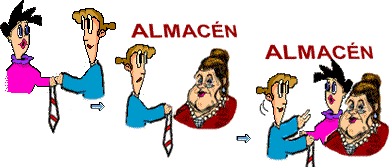40. Pretéritos: perfecto simple vs. imperfecto / Imperfect vs. Preterite
- Page ID
- 16235
\( \newcommand{\vecs}[1]{\overset { \scriptstyle \rightharpoonup} {\mathbf{#1}} } \)
\( \newcommand{\vecd}[1]{\overset{-\!-\!\rightharpoonup}{\vphantom{a}\smash {#1}}} \)
\( \newcommand{\dsum}{\displaystyle\sum\limits} \)
\( \newcommand{\dint}{\displaystyle\int\limits} \)
\( \newcommand{\dlim}{\displaystyle\lim\limits} \)
\( \newcommand{\id}{\mathrm{id}}\) \( \newcommand{\Span}{\mathrm{span}}\)
( \newcommand{\kernel}{\mathrm{null}\,}\) \( \newcommand{\range}{\mathrm{range}\,}\)
\( \newcommand{\RealPart}{\mathrm{Re}}\) \( \newcommand{\ImaginaryPart}{\mathrm{Im}}\)
\( \newcommand{\Argument}{\mathrm{Arg}}\) \( \newcommand{\norm}[1]{\| #1 \|}\)
\( \newcommand{\inner}[2]{\langle #1, #2 \rangle}\)
\( \newcommand{\Span}{\mathrm{span}}\)
\( \newcommand{\id}{\mathrm{id}}\)
\( \newcommand{\Span}{\mathrm{span}}\)
\( \newcommand{\kernel}{\mathrm{null}\,}\)
\( \newcommand{\range}{\mathrm{range}\,}\)
\( \newcommand{\RealPart}{\mathrm{Re}}\)
\( \newcommand{\ImaginaryPart}{\mathrm{Im}}\)
\( \newcommand{\Argument}{\mathrm{Arg}}\)
\( \newcommand{\norm}[1]{\| #1 \|}\)
\( \newcommand{\inner}[2]{\langle #1, #2 \rangle}\)
\( \newcommand{\Span}{\mathrm{span}}\) \( \newcommand{\AA}{\unicode[.8,0]{x212B}}\)
\( \newcommand{\vectorA}[1]{\vec{#1}} % arrow\)
\( \newcommand{\vectorAt}[1]{\vec{\text{#1}}} % arrow\)
\( \newcommand{\vectorB}[1]{\overset { \scriptstyle \rightharpoonup} {\mathbf{#1}} } \)
\( \newcommand{\vectorC}[1]{\textbf{#1}} \)
\( \newcommand{\vectorD}[1]{\overrightarrow{#1}} \)
\( \newcommand{\vectorDt}[1]{\overrightarrow{\text{#1}}} \)
\( \newcommand{\vectE}[1]{\overset{-\!-\!\rightharpoonup}{\vphantom{a}\smash{\mathbf {#1}}}} \)
\( \newcommand{\vecs}[1]{\overset { \scriptstyle \rightharpoonup} {\mathbf{#1}} } \)
\(\newcommand{\longvect}{\overrightarrow}\)
\( \newcommand{\vecd}[1]{\overset{-\!-\!\rightharpoonup}{\vphantom{a}\smash {#1}}} \)
\(\newcommand{\avec}{\mathbf a}\) \(\newcommand{\bvec}{\mathbf b}\) \(\newcommand{\cvec}{\mathbf c}\) \(\newcommand{\dvec}{\mathbf d}\) \(\newcommand{\dtil}{\widetilde{\mathbf d}}\) \(\newcommand{\evec}{\mathbf e}\) \(\newcommand{\fvec}{\mathbf f}\) \(\newcommand{\nvec}{\mathbf n}\) \(\newcommand{\pvec}{\mathbf p}\) \(\newcommand{\qvec}{\mathbf q}\) \(\newcommand{\svec}{\mathbf s}\) \(\newcommand{\tvec}{\mathbf t}\) \(\newcommand{\uvec}{\mathbf u}\) \(\newcommand{\vvec}{\mathbf v}\) \(\newcommand{\wvec}{\mathbf w}\) \(\newcommand{\xvec}{\mathbf x}\) \(\newcommand{\yvec}{\mathbf y}\) \(\newcommand{\zvec}{\mathbf z}\) \(\newcommand{\rvec}{\mathbf r}\) \(\newcommand{\mvec}{\mathbf m}\) \(\newcommand{\zerovec}{\mathbf 0}\) \(\newcommand{\onevec}{\mathbf 1}\) \(\newcommand{\real}{\mathbb R}\) \(\newcommand{\twovec}[2]{\left[\begin{array}{r}#1 \\ #2 \end{array}\right]}\) \(\newcommand{\ctwovec}[2]{\left[\begin{array}{c}#1 \\ #2 \end{array}\right]}\) \(\newcommand{\threevec}[3]{\left[\begin{array}{r}#1 \\ #2 \\ #3 \end{array}\right]}\) \(\newcommand{\cthreevec}[3]{\left[\begin{array}{c}#1 \\ #2 \\ #3 \end{array}\right]}\) \(\newcommand{\fourvec}[4]{\left[\begin{array}{r}#1 \\ #2 \\ #3 \\ #4 \end{array}\right]}\) \(\newcommand{\cfourvec}[4]{\left[\begin{array}{c}#1 \\ #2 \\ #3 \\ #4 \end{array}\right]}\) \(\newcommand{\fivevec}[5]{\left[\begin{array}{r}#1 \\ #2 \\ #3 \\ #4 \\ #5 \\ \end{array}\right]}\) \(\newcommand{\cfivevec}[5]{\left[\begin{array}{c}#1 \\ #2 \\ #3 \\ #4 \\ #5 \\ \end{array}\right]}\) \(\newcommand{\mattwo}[4]{\left[\begin{array}{rr}#1 \amp #2 \\ #3 \amp #4 \\ \end{array}\right]}\) \(\newcommand{\laspan}[1]{\text{Span}\{#1\}}\) \(\newcommand{\bcal}{\cal B}\) \(\newcommand{\ccal}{\cal C}\) \(\newcommand{\scal}{\cal S}\) \(\newcommand{\wcal}{\cal W}\) \(\newcommand{\ecal}{\cal E}\) \(\newcommand{\coords}[2]{\left\{#1\right\}_{#2}}\) \(\newcommand{\gray}[1]{\color{gray}{#1}}\) \(\newcommand{\lgray}[1]{\color{lightgray}{#1}}\) \(\newcommand{\rank}{\operatorname{rank}}\) \(\newcommand{\row}{\text{Row}}\) \(\newcommand{\col}{\text{Col}}\) \(\renewcommand{\row}{\text{Row}}\) \(\newcommand{\nul}{\text{Nul}}\) \(\newcommand{\var}{\text{Var}}\) \(\newcommand{\corr}{\text{corr}}\) \(\newcommand{\len}[1]{\left|#1\right|}\) \(\newcommand{\bbar}{\overline{\bvec}}\) \(\newcommand{\bhat}{\widehat{\bvec}}\) \(\newcommand{\bperp}{\bvec^\perp}\) \(\newcommand{\xhat}{\widehat{\xvec}}\) \(\newcommand{\vhat}{\widehat{\vvec}}\) \(\newcommand{\uhat}{\widehat{\uvec}}\) \(\newcommand{\what}{\widehat{\wvec}}\) \(\newcommand{\Sighat}{\widehat{\Sigma}}\) \(\newcommand{\lt}{<}\) \(\newcommand{\gt}{>}\) \(\newcommand{\amp}{&}\) \(\definecolor{fillinmathshade}{gray}{0.9}\)|
Hay dos tiempos simples para el pasado (pretérito):
Cada uno comunica significados diferentes según se perciba el pasado desde fuera como algo ya completo y terminado (perfecto) o desde dentro como algo aún en proceso (imperfecto). |
There are two simple tenses for the past (preterit) in Spanish:
Each one conveys different meanings depending on how the past is perceived: from outside as something already complete and finished (perfect), or from inside as something still in progress (imperfect). |
 Aún preparabas el desayuno... (en proceso, imperfecto)  |
 Ya preparaste el desayuno. (proceso completado, perfecto)  |
Perfecto vs. Imperfecto
| Un tiempo "perfecto" representa hechos que se consideran completos dentro de un marco de tiempo finito. El hecho se percibe después de que ocurrió, desde fuera, como un proceso terminado "allá" en el pasado: La fiesta terminó a las doce de la noche. Estuvo buenísima. (estamos "fuera" del hecho ya completo) |
A "perfect" tense reports events viewed as completed within a finite time frame. The event is perceived after the fact, from without, as a finished process which took place "over there" in the past: The party ended at twelve midnight. It was super (all in all). (we're "outside" of a completed event) |
| Un tiempo "imperfecto" indica duración, acción en progreso, un hecho que en ese momento no está completo. El hecho se percibe mientras ocurría, desde dentro, como un proceso que "aquí" en el pasado aún no termina: Eran las doce y la fiesta todavía no terminaba. Estaba buenísima. (estamos "dentro" del hecho en curso) |
An "imperfect" tense conveys durtion, progression, an event not yet completed at the moment being evoked. The event is perceived during the fact, from within, as a process that is not over yet "here" in the past: It was twelve and the party was not over yet. It was super (still on). (we're "inside" of an event in progress) |
| IMPERFECTO ("durante" los hechos) | PRETÉRITO PERFECTO SIMPLE ("después" de los hechos) |
| El cielo estaba nublado ayer. (descripción desde "dentro" del día en curso) The sky was cloudy yesterday. (description from within the day in progress) |
El cielo estuvo nublado ayer. ("ayer" está "allá" como un marco finito y terminado) The sky was cloudy yesterday. (a complete event framed in a past "over there") |
| Cuando subía las escaleras, sonó el teléfono. (estaba subiendo, en progreso) When (while) I was going up the stairs, the phone rang. (unfinished process) |
Cuando subí las escaleras, sonó el teléfono. (terminé de subir) When (after) I went up the stairs, the phone rang. (finished process) |
| Ana antes trabajaba en un restaurante. (estaba trabajando, en progreso) Ana used to work in a restaurant in the past. (indefinite period, unfinished process) |
Ana trabajó dos o tres años en un restaurante. (dos o tres años: marco finito) Ana worked in a restaurant for two or three years. (definite time frame, finished process) |
¡A practicar!
Escriba la forma verbal que corresponde a cada situación, como en el ejemplo. [Ejercicio interactivo] (Diccionario).
| 1. Ayer sonó el teléfono cuando me senté / sentaba a desayunar. | a. me sentaba : b. me senté : |
Aún me estaba sentando. Ya estaba sentado. |
| 2. Fueron / Iban al mercado, pero regresaron a buscar la lista de compras. | a. ____________: b. ____________: |
Llegaron al mercado. No llegaron al mercado. |
| 3. Empezó a leer el libro y le gustó / gustaba ... | a. ____________: b. ____________: |
Definitivamente le gustó. No se sabe si por fin le gustó. |
| 4. Te vi cuando subí / subía las escaleras al segundo piso. | a. ____________: b. ____________: |
Yo estaba en las escaleras. Yo estaba en el segundo piso. |
| 5. Estaban nerviosos y no supieron / sabían qué responder. | a. ____________: b. ____________: |
Tal vez respondieron bien. No respondieron bien. |
| 6. Abrí la puerta pero el perro no quiso / quería entrar. | a. ____________: b. ____________: |
No entró. No se sabe si entró o no. |
| 7. La casa fue / era bonita. | a. ____________: b. ____________: |
Todavía puede ser bonita. Ya no es bonita. |
| 8. La ciudad estuvo / estaba en ruinas. | a. ____________: b. ____________: |
Fue reconstruida. No se sabe si aún está en ruinas. |
- Traducción al inglés
- 1. Yesterday the phone rang when I sat / was about to sit to have breakfast.
 2. They went / were going to the market, they came back to get the shopping list.
2. They went / were going to the market, they came back to get the shopping list.  3. S/he started reading the book and liked / was liking it...
3. S/he started reading the book and liked / was liking it...  4. I saw you when I went / was going up the stairs.
4. I saw you when I went / was going up the stairs.  5. They were nervous and didn't know / weren't sure what to answer.
5. They were nervous and didn't know / weren't sure what to answer.  6. I opened the door but the dog refused / didn't want to get in.
6. I opened the door but the dog refused / didn't want to get in.  7. The house was pretty.
7. The house was pretty.  8. The city was in ruins.
8. The city was in ruins.
- Respuestas
- 2. a) fueron (llegaron), b) iban (no llegaron) 3. a) gustó (definitivamente), b) gustaba (no se sabe) 4. a) subía (estaba en las escaleras), b) subí (estaba en el segundo piso) 5. a) no sabían (tal vez sí respondieron), b) no supieron (no respondieron bien) 6. a) no quiso (no entró), b) no quería (no se sabe si entró)
7. a) era (todavía puede ser), b) fue (ya no es) 8. a) estuvo (fue reconstruida), b) estaba (no se sabe si aún está)
Diferencias al narrar
|
Al narrar, cada tiempo tiene una función específica:
|
For narration, each tense has a distinct function:
|
| Para contar lo que alguien dijo originalmente en presente (hechos no terminados), se emplea el imperfecto (hechos no terminados durante el pasado: situaciones continuas, descripción de circunstancias, intenciones, hábitos, acciones en progreso; ver §39): Vivo en La Paz. → Dijo que vivía en La Paz. (situación continua) Tengo veinte años. → Me contó que tenía veinte años. (descripción) Quiero estudiar. → Declaró que quería estudiar. (intención) Leo todos los días. → Me explicó que leía todos los días. (hábito) Ahora voy hacia mi casa. → Dijo que iba hacia su casa. (acción en progreso) Estoy en París. → Soñé que estaba en París. (descripción) Si la declaración original estaba en imperfecto, este se mantiene: Nunca comíamos en casa. → Dijo que nunca comían en casa. ► Ver también: "Cómo contar lo que alguien dijo". |
When reporting in the past tense what someone originally said in the present (incomplete current events), the imperfect is used (incomplete events during the past: ongoing conditions, description of circumstances, intentions, habits, actions in progress; see §39). I live in La Paz. → He said he lived in La Paz. (ongoing condition) I am twenty. → He told me he was twenty. (description) I want to study. → He stated he wanted to study. (intention) I read every day. → He explained that he used to read every day. (habit) Now I am heading home. → He said he was heading home. (in progress) I am in Paris. → I dreamed I was in Paris. (description) If the original statement was in the imperfect, keep it: We never ate at home. → He said they never ate at home. ► See also: "Reported Speech". |
¡A practicar!
Complete con el pretérito o el imperfecto del verbo entre paréntesis. [Ejercicio interactivo] (Diccionario: https://www.wordreference.com/es/).
1. El domingo, mientras _________ (ver [yo]) un documental cómodamente, ________ (sonar) el teléfono.
2. _____ (ser) Jorge, mi jefe. Me _______ (decir [él]) que _________ (necesitar) consejo.
3. Al oír su voz, __________ (sentir [yo]) impaciencia, porque __________ (querer) seguir viendo televisión.
4. Pero ___________ (escuchar [yo]) con paciencia todo lo que ___________ (tener [él]) para decirme.
5. Cuando por fin ___________ (terminar [nosotros]) la conversación, ya ________ (ser) las cinco de la tarde.
6. Entonces _________ (decidir [yo]) salir un rato, porque la tarde __________ (estar) fresca.
7. ________ (caminar [yo]) durante casi dos horas y, cuando _________ (regresar) a casa, ya _____ (ser) hora de cenar.
8. Por eso no ____________ (terminar [yo]) el programa que __________ (estar) viendo cuando me __________ (llamar) mi estimado jefe.
- Traducción al inglés
- 1. On Sunday, while I was watching a documentary comfortably, the phone rang. 2. It was Jorge, my boss. He told me he needed some advice. 3. On hearing his voice, I felt impacience, because I wanted to keep watching TV. 4. But I listened patiently everything he had to tell me. 5. When at last we finished the conversation, it was already five in the afternoon. 6. So I decided to go out for a while, because the afternoon was cool. 7. I walked for almost two hours and, when I returned home, it was time for dinner. 8. That's why I didn't finish the show I was watching when my esteemed boss called me.
- Respuestas
- 1. veía - sonó 2. era - dijo - necesitaba 3. sentí - quería 4. escuché - tenía
5. terminamos - eran 6. decidí - estaba 7. Caminé - regresé - era 8. terminé - estaba - llamó
Complete con el pretérito o el imperfecto del verbo entre paréntesis. [Ejercicio interactivo] (Diccionario).
| 1. En su cumpleaños, su novia le ________ (regalar) una corbata, pero ________ (estar) pasada de moda. 2. Al día siguiente ________ (decidir) devolverla porque ________ (querer) una más moderna. 3. Entonces ________ (ir) al almacén y, mientras ________ (hablar) con la vendedora, 4. ________ (ver ) a su novia que ________ (venir) por el pasillo. 5. Como no ________ (querer) ofenderla, le ________ (decir) que 6. ________ (estar) comprando otra igual porque esa ________ (ser) bellísima. 7. Y así ________ (ser) como ________ (terminar) con dos corbatas que no le ________ (gustar). |
 |
- Traducción al inglés
- 1. For his birthday, his girlfriend gave him a necktie, but it was out of fashion. 2. The next day he decided to return it because he wanted a more modern one. 3. So, he went to the store and, while he was talking to the clerk, 4. he saw his girlfriend was coming down the hall. 5. Since he didn't want to offend her, he told her that 6. he was buying another one that looked the same because that one was extremely beautiful. 7. And this was how he ended up with two neckties he didn't like.
- Respuestas
- 1. regaló - estaba 2. decidió - quería 3. fue - hablaba 4. vio - venía
5. quería - dijo 6. estaba - era 7. fue - terminó - gustaban/gustaron
Cambios de significado
| Siguiendo la idea general de algo aún en proceso (imperfecto) o ya completo (pretérito), hay ciertos verbos que comunican una idea un poco diferente en cada tiempo verbal: | Following the general idea of something still in progress (imperfect) or already complete (preterite), some verbs convey different ideas in each tense which need to be expressed with different verbs in English: |
|
|
| Él dijo que podía ayudarme, pero al fin no pudo porque tuvo que viajar. Pensé que no podían venir, pero después de todo sí pudieron y aquí están. Teníamos que ir a la clase, pero tuvimos que llevar al perro al veterinario. Ella quería hablar contigo, ¿por qué no quisiste contestarle? Tenía miedo y quise gritar, pero no me salía la voz. No llamé anoche porque no quería molestarte. En 2005 no conocía a José. Lo conocí en 2006. Yo ya conocía la ciudad, pero en este viaje conocí lugares nuevos. Silvia estaba intranquila porque no sabía si estabas bien. Silvia saltó de alegría cuando supo que estabas bien. Yo sabía que ibas a estar alegre con la noticia. |
He said he could help me, but he finally failed to because he had to travel. I thought they couldn't come, but they managed to after all and here they are. We were supposed to go to class, but we had to take the dog to the vet. She had the desire to talk to you, why did you refuse to answer her? I was afraid and tried to cry, but my voice would not come out. I didn't call last night because I did not want to disturb you. I didn't know José in 2005. I met him in 2006. I already knew the city, but in this trip I got to know new places. Silvia was uneasy because she didn't know if you were ok. Silvia jumped with joy when she learned you were fine. I knew you were going to be happy with the news. |
¡A practicar!
Subraye la forma más apropiada de cada verbo. [Ejercicio interactivo] (Diccionario bilingüe: https://www.wordreference.com/es/)
 Bogotá de noche (Wikicommons) |
Antes yo no (1. sabía/supe) nada sobre Colombia, pero el diciembre pasado (2. viajaba/viajé) a Bogotá y (3. aprendía/aprendí) mucho sobre el país. Durante mi visita, (4. conocía/conocí) varios centros comerciales, discotecas, universidades y parques inmensos. También (5. podía/pude) ver obras originales de Fernando Botero, el famoso pintor de figuras voluminosas. El último día, un guía turístico me (6. decía/dijo) que yo no (7. podía/pude) irme sin ver el Museo del Oro, e inmediatamente (8. decidía/decidí) visitarlo. Afortunadamente, esa misma tarde (9. podíamos/pudimos) ir al museo. Allí (10. había/hubo) impresionantes piezas de oro elaboradas por la cultura Muisca, los indígenas de esa región. También (11. sabíamos/supimos) que los muiscas nunca (12. querían/quisieron) revelar el secreto de El Dorado –la legendaria ciudad de oro– a los españoles, quienes no (13. podían/pudieron) encontrarlo jamás. Paradójicamente, los colombianos (14. daban/dieron) el nombre de "Eldorado" al aeropuerto internacional de la capital. Gracias a este viaje, (15. sabía/supe) que Bogotá es una ciudad muy moderna con una rica historia. |
- Traducción al inglés
- (1) I didn't know anything about Colombia before, but last December (2) I traveled to Bogotá and (3) learned a lot about the country. During my visit, (4) I became familiar with several shopping malls (for the first time), dancing clubs, universities, and huge parks. I also (5) managed to see original works by Fernando Botero –the famous artist who paints voluminous shapes–. On our last day, a tourist guide (6) told me that (7) I could not leave without seeing the Gold Museum, and immediately (8) I decided to visit it. Fortunately, that same afternoon (9) we managed to go to the museum. (10) There were impressing gold pieces elaborated by the Muisca culture, the indigenous group from that region. We also (11) learned that the Muiscas always (12) refused to reveal the secret of El Dorado –the legendary golden city– to the Spaniards, who (13) failed to find it at all. Paradoxically, Colombians (14) gave the capital's international airport the name of "Eldorado". Thanks to this trip, (15) I learned that Bogotá is a very modern city with a rich history.
- Respuestas
- 1. sabía 2. viajé 3. aprendí 4. conocí 5. pude 6. dijo 7. podía 8. decidí
9. pudimos 10. había 11. supimos 12. quisieron 13. pudieron 14. dieron 15. supe
Práctica interactiva
• ASCCC: seis actividades en contexto
• aprenderespañol: https://aprenderespanol.org/verbos/preterito-imperfecto-indefinido.html
• Nelson: https://personal.colby.edu/~bknelson/SLC/pret_imp.html
• profedeele: contraste de pasados
• U Texas - Austin: preterite vs. imperfect (explicación, videos, frases)
• ver-taal: leyenda de Sac-Nicté: parte 1 - parte 2 - parte 3 - fumadores arrepentidos
• Yepes: http://www.bowdoin.edu/~eyepes/newgr/pret.htm


